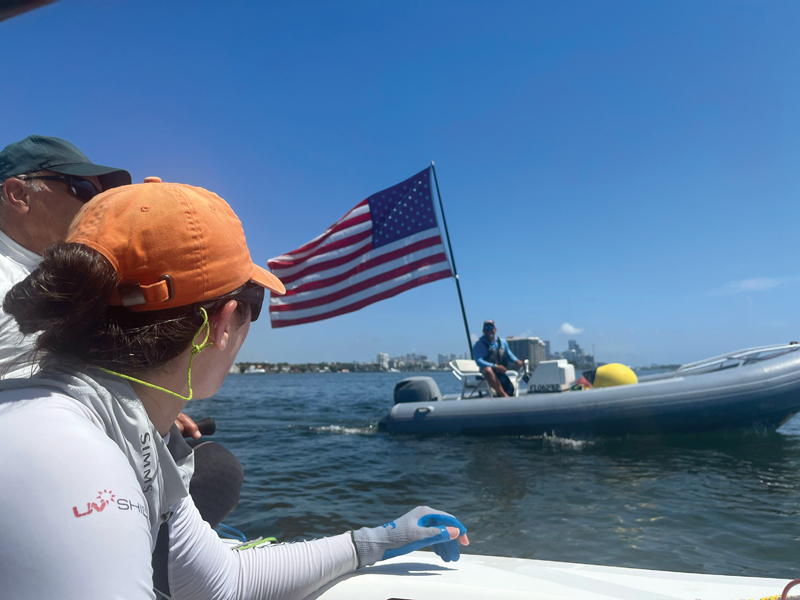
It can be awkward for your long-formed habits to be questioned during coaching, but what if it helps you sail faster?
While junior sailors get a lot of coaching—whether through high school programs or summer lessons and teams—opportunities for “grownups” to get coaching are fewer and farther between. Whether you sign up for a coached clinic or seek out a coach for a private session, it’s an opportunity you want to make the most of.
Get prepared
Go into your time prepared and with specific goals. Do you want to work on boathandling? Boat speed? Boat setup? (Yes, the answer can be more than one of those.) Make your topics and questions as specific as possible, and communicate those to the coach well before the session so they can construct an agenda to address your questions.
Ask questions
Don’t hesitate to ask about what seems like the small stuff. For example, a few months ago, I was lucky to sail with a team that worked with a coach the day after a regatta. The boat was new-ish to me, and I was having problems figuring out where and how to sit downwind. I literally asked, “Can you suggest where I should put my feet and butt when I’m flying the spinnaker?” The coach was able to suggest making sure I was putting my aft-most foot under a certain hiking strap to help orient my body the right way. Seems small, but it was huge.
Embrace your coach's criticism
Have an open mind and be willing to feel criticized (constructively, of course). If you knew everything there was to know about sailing and racing your boat, you wouldn’t need a coach, right? So, if you’re eager to learn from an expert, help them help you. Sure, it can be awkward to have long-formed habits questioned. But if they make you faster? Bring it on. Be open to addressing your flaws. We all have them, but learning from them and building on them is what helps us progress.
Show up race-ready
Prepare as if it were a race day. Make sure you’re ready to roll well before the coach arrives. Don’t waste their time (and yours, really!) pulling your sails out of your car and rigging or searching for your lifejacket. Get your boat set up for how you would race that day, given the weather conditions.
Just like practices or fitness sessions, coaching sessions will likely be more exhausting—mentally and physically—than a race day. You’ll do so many more tacks, gybes, sets, and douses than you do on a standard racing day. Make sure you bring plenty of hydration and nutrition, and take breaks during your session to drink, eat, and take a deep breath so that you’re able to take in all the coach has to offer. Then, sleep well the night after, dreaming of all the ways you’ll go faster!
Get footage and debrief
Make sure your coach has a plan to get and share photos and videos. Getting these images from off the boat provides an important and different perspective. Consider mounting a GoPro onboard if you need to focus on boathandling (and that’s something you can do even without a coach).
After the session, debrief together. Technology is your friend. We’ve learned so much about Zoom calls and sharing presentations over the past few years, you can even do post-session debriefs a few days after your on-the-water time if you are time-limited. Delaying your debrief a few days can give coach and coachees alike some time to sort through photos and videos and to identify takeaways and questions.
Keep good notes. Review them together with your team before your next practice session or regatta. Perhaps pick three things for upwind, three things for downwind, and three things for mark roundings that you learned out of your training session you really want to focus on. That will help you cement those newly learned skills into good habits.
Finally, the experience of being coached is not a one-way street. Don’t expect to just be told what to do and for it to *snaps fingers* make you faster and smarter. Go in with lots of energy and questions. Make the experience a dialogue, and you’re sure to benefit.
by Kim Couranz
About the Author: SpinSheet Small Boat columnist for more than a dozen years, Kim Couranz has earned several national and world titles in Laser Radials (ILCA 6) and Snipes. She has also raced J/22s, J/24s, and Ynglings on an international level.




